Arts & Entertainment
WeHo Pride and OUTLOUD Music Festival to host free concert
Registration for free tickets will open tomorrow, May 16 at 10a.m. PT

On Friday, May 30, WeHo Pride and OUTLOUD will kick off the weekend full of festivities with a free WeHo Pride Presents Friday Night outdoor concert.
WeHo Pride and OUTLOUD Music Festival have come together this year featuring a lineup of LGBTQ performers and LGBTQ-focused programming for all ages.
The kick off event is free, but requires an RSVP to secure the complimentary tickets and registration for tickets officially opens on Friday, May 16 at 10a.m. The headlining performer will be Maren Morris, a GRAMMY award-winning, singer-songwriter who came out as bisexual during Pride month last summer and released her fourth album earlier this month.
The OUTLOUD Music Festival will continue on Saturday, May 31, and Sunday, June 1, with a two-day concert experience spotlighting a dynamic lineup of LGBTQ+ artists including Lizzo, Remi Wolf, Kim Petras and Paris Hilton — all set to perform on the mainstage. Lil Nas X was also set to perform, but has been taken out of the lineup due to health issues.
The SummerTramp stage will have Honey Dijon as the headliner, and feature sets from Horse Meat Disco, salute, Meredith Marks, Brooke Eden, and others. The Saturday and Sunday concerts are not free and do require tickets to be purchased in advance.
“WeHo Pride Weekend is nearly upon us. Hosting WeHo Pride Presents Friday Night at OUTLOUD with free-entry tickets is more than symbolic — it’s a declaration that equality and inclusion matter,” said Chelsea Lee Byers, mayor of West Hollywood. “In West Hollywood, we celebrate queer lives and artists. At a time when LGBTQ communities face a surge of attacks across the country, West Hollywood remains committed to raising visibility and vibrantly celebrating our community. I’m so proud that the City of West Hollywood stands firm in the fight for LGBTQ rights and creative expression. I hope to see everyone out on Friday Night at OUTLOUD!”
WeHo Pride Presents Friday Night at OUTLOUD will begin at 6p.m. on Friday, May 30. The free WeHo Pride Street Fair will then take place on Saturday, May 31 and Sunday, June 1, beginning at noon. Both days will feature live entertainment, drag performances, activities and dyke-tivities such as the Dyke March and Women’s Freedom Festival on Saturday, taking place at the WeHo Pride Community Stage.
“This event is all about showing up, celebrating loudly, and creating space for queer joy and none of it would be possible without the incredible support from the City of West Hollywood,” said Jeff Consoletti, founder and executive producer of OUTLOUD. “We’re beyond grateful to have our partnership extended through 2030 and can’t wait to keep building something unforgettable together year after year.”
Weekend and single day passes are on sale now.
For more information, visit the OUTLOUD Festival website.
Movies
Moving doc ‘Come See Me’ is more than Oscar worthy
Poet Laureate Andrea Gibson, wife negotiate highs and lows of terminal illness

When Colorado Poet Laureate Andrea Gibson died from ovarian cancer in the summer of 2025, the news of their passing may have prompted an outpouring of grief from their thousands of followers on social media, but it was hardly a surprise.
That’s because Gibson – who had risen to both fame and acclaim in the early 2000s with intense live performances of their work that made them a “superstar” at Poetry Slam events – had been documenting their health journey on Instagram ever since receiving the diagnosis in 2021. During the process, they gained even more followers, who were drawn in by the reflections and explorations they shared in their daily posts. It was really a continuation, a natural evolution of their work, through which their personal life had always been laid bare, from the struggles with queer sexuality and gender they experienced in their youth to the messy relationships and painful breakups of their adult life; now, with precarious health prohibiting a return to the stage, they had found a new platform from which to express their inner experience, and their fans – not only the queer ones for whom their poetry and activism had become a touchstone, but the thousands more who came to know them through the deep shared humanity that exuded through their online presence – were there for it, every step of the way.
At the same time, and in that same spirit of sharing, there was another work in progress around Gibson: “Come See Me in the Good Light,” a film conceived by their friends Tig Notaro and Stef Willen and directed by seasoned documentarian Ryan White (“Ask Dr. Ruth”, “Good Night, Oppy”, “Pamela, a Love Story”), it was filmed throughout 2024, mostly at the Colorado home shared by Gibson and their wife, fellow poet Megan Falley, and debuted at the 2025 Sundance Film Festival before a release on Apple TV in November. Now, it’s nominated for an Academy Award.
Part life story, part career retrospective, and part chronicle of Gibson and Falley’s relationship as they negotiate the euphoric highs and heartbreaking lows of Gibson’s terminal illness together, it’s not a film to be approached without emotional courage; there’s a lot of pain to be vicariously endured, both emotional and physical, a lot of hopeful uplifts and a lot of crushing downfalls, a lot of spontaneous joy and a lot of sudden fear. There’s also a lot of love, which radiates not only from Gibson and Falley’s devotion and commitment to being there for each other, no matter what, but through the support and positivity they encounter from the extended community that surrounds them. From their circle of close friends, to the health care professionals that help them navigate the treatment and the difficult choices that go along with it, to the extended family represented by the community of fellow queer artists and poets who show up for Gibson when they make a triumphant return to the stage for a performance that everyone knows may well be their last, nobody treats this situation as a downer. Rather, it’s a cause to celebrate a remarkable life, to relish friendship and feelings, to simply be present and embrace the here and now together, as both witness and participant.
At the same time, White makes sure to use his film as a channel for Gibson’s artistry, expertly weaving a showcase for their poetic voice into the narrative of their survival. It becomes a vibrant testament to the raw power of their work, framing the poet as a seminal figure in a radical, feminist, genderqueer movement which gave voice to a generation seeking to break free from the constraints of a limited past and imagine a future beyond its boundaries. Even in a world where queer existence has become – yet again – increasingly perilous in the face of systemically-stoked bigotry and bullying, it’s a blend that stresses resilience and self-empowerment over tragedy and victimhood, and it’s more than enough to help us find the aforementioned emotional courage necessary to turn what is ultimately a meditation on dying into a validation of life.
That in itself is enough to make “Come See Me in the Good Light” worthy of Oscar gold, and more than enough to call it a significant piece of queer filmmaking – but there’s another level that distinguishes it even further.
In capturing Gibson and Falley as they face what most of us like to think of as an unimaginable future, White’s quietly profound movie puts its audience face-to-face with a situation that transcends all differences not only of sexuality or gender, but of race, age, or economic status as well. It confronts us with the inevitability few of us are willing to consider until we have to, the unhappy ending that is rendered certain by the joyful beginning, the inescapable conclusion that has the power to make the words “happily ever after” feel like a hollow promise. At the center of this loving portrait of a great American artist is a universal story of saying goodbye.
Yes, there is hope, and yes, good fortune often prevails – sometimes triumphantly – in the ongoing war against the cancer that has come to threaten the palpably genuine love this deeply-bonded couple has found together; but they (and we) know that, even in the best-case scenario, the end will surely come. All love stories, no matter how happy, are destined to end with loss and sorrow; it doesn’t matter that they are queer, or that their gender identities are not the same as ours – what this loving couple is going through, together, is a version of the same thing every loving couple lucky enough to hold each other for a lifetime must eventually face.
That they meet it head on, with such grace and mutual care, is the true gift of the movie.
Gibson lived long enough to see the film’s debut at Sundance, which adds a softening layer of comfort to the knowledge we have when watching it that they eventually lost the battle against their cancer; but even if they had not, what “Come See Me in the Good Light” shows us, and the unflinching candor with which it does so, delivers all the comfort we need.
Whether that’s enough to earn it an Oscar hardly matters, though considering the notable scarcity of queer and queer-themed movies in this year’s competition it might be our best shot at recognition.
Either way, it’s a moving and celebratory film statement with the power to connect us to our true humanity, and that speaks to a deeper experience of life than most movies will ever dare to do.
Books
The social side of self-pleasure: Artist Jason Wimberly presents his newest book of photography, HOMOSOCIAL
A bold, cheeky, and unexpectedly tender exploration of male intimacy, HOMOSOCIAL’s Jason Wimberly reimagines shared self-pleasure as an act of liberation and radical self-acceptance through photography
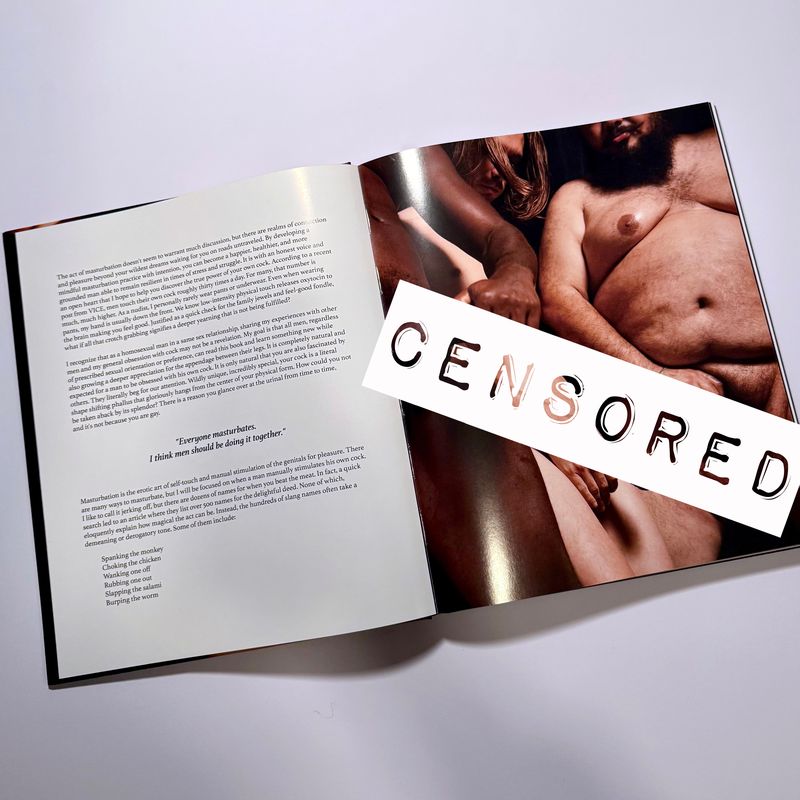
In his delicious new book HOMOSOCIAL: Bonded Through Cock, artist Jason Wimberly ushers readers into a world where male intimacy is neither hush-hush nor hailed from the shadows, but unapologetically celebrated and dripping with joy. With a frothy mix of warmth and whimsy, he reconfigures mutual pleasure as something much more radical than simple titillation. Through his work, Wimberly creates an avenue to connection and vulnerability, and it never looks so good. HOMOSOCIAL asks what could possibly happen if men were allowed to come together and enjoy their own bodies while also enjoying each other’s presence without the fear of judgment.
What HOMOSOCIAL offers us is a discussion that blurs the lines between eroticism and commentary. Drawing from years of nude wellness retreats, collaborative photo sessions, and personal loss, the book posits self-touch as self-knowledge. It can be playful at times, spiritual at others, and always so very human. In this interview with Wimberly, we dive into the intention behind the imagery and why the simple act of men embracing their shared anatomy might just be more revolutionary than it initially sounds.
HOMOSOCIAL is a word loaded with male beauty. Why did you choose this title, and what does it mean to you in the context of this book?
My new book, HOMOSOCIAL: Bonded Through Cock, is a love letter to hard cocks, male masturbation, and my steadfast belief that men should enjoy both things freely and openly together without shame. If more men were able to jerk off together as a social activity without it having an impact on their perceived sexual orientation, I think it would just about end world war. Of course, mutual masturbation is nothing new. In fact, men are inherently bonded through the shared knowledge of having a cock, and I want to empower more men to share that pleasure freely and socially.
Your work in this book centers on self-love in its most carnal form. What drew you to masturbation as a subject, and how does this book contribute to the conversation?
I have produced 25 nude wellness events for men that aim to empower my guests through a daily protocol of movement, mindfulness, and masturbation while naked in nature. The goal is to inspire them all to have as many first experiences daily as possible. Those firsts can inspire change and growth in themselves and their lives. Masturbation is simply one of the many ways we work to maximize our physical and emotional health by bringing awareness and attention to things that may otherwise seem mundane in the real world. But when you’re naked in the woods for a week, with five other men who are all there focused on feeling their best, masturbating in the woods together can be a spiritual experience. The sun on your balls, the birds in the sky, and a private eighteen-acre property to fully embrace your primal side.
You’ve said the book can’t be shown online but must be experienced in person. What about the experience changes when this work is encountered in the flesh rather than through a screen?
I don’t recall saying that, but that sounds like me. As an elder millennial approaching 45, I am foolishly hanging onto as much of my analog life as possible before the complete AI takeover. I used no AI in writing my book. I don’t even know what ChatGPT is. I love books. Reading is so important, and holding a book in your hand is just so different to me than reading a screen. Of course, the book is available for digital download as well, and formatted in a font and layout that is a little easier to read online. There’s just something so titillating about holding a big, hard book full of cocks in your hand, in my opinion.
Circus of Books is a legendary queer space with its own history of censorship and resistance. How does showing HOMOSOCIAL in this cock-clad cathedral influence the meaning of the project?
It was an absolute honor to launch the book at Circus of Books in every way. I am close friends with the owner and have been talking about this project for years. It almost didn’t happen so many times, so when I finally hung my artwork up on the walls for the opening reception, it was almost surreal. I just wrapped a month-long exhibition there that featured six-foot-tall images of men masturbating together. As a self-published artist and author, I was gobsmacked by the support and turnout for my events. During the opening events, I even developed a special way of signing books with my balls. I think I just invented ball stamps, and it’s been so much fun.
Many of the models appear repeatedly throughout the book. How did trust & vulnerability factor into your process when working with them?
I did an online casting for a diverse selection of men. Representation of all body types was a massive focus. It was important to show all ages, sizes, shapes, penis sizes, and colors of skin. I am so proud of the boys who came together for the shoot. I call them my boys, but they are really men, and very brave ones at that. The only requirement in the casting was that you were comfortable masturbating on camera with other men. Once I had a cast, I shared the first 10 pages of the book and the mood boards I had created. The day of the shoot, we spent about 8 hours together hanging out, becoming buddies, and playing with our boners all day. The images show the continuation of the day, and you can see them get closer, and the smiles get bigger. Each shot is just joyful, natural, and hot as hell. There was also something special that happened in the money shots that was so pure. I don’t want to give it all away, but the boys really trusted me and each other, and we all just had a ton of fun.
How do race, shape, age, and gender expression factor into your casting and visual language of the book?
I want my work to be accessible to all men. I have a wide variety of guys who come to my events, and I want to be sure to represent that. It’s important to me that everyone feels welcome. I was not looking for a body type or a look, but I was looking for attributes. I wanted real, natural, and proud men. Those qualities need no physical qualifiers, and that is sort of the beauty of getting guys naked together. It strips away everything we can hide behind and allows us to connect over the things that we have in common.
In this case, our cocks.
How do you navigate the line between erotic imagery and fine art? Do you even believe that line still matters?
There is a quote from Gloria Leonard in my book that says, “The difference between pornography and erotica is lighting.” I think all art is subjective, but HOMOSOCIAL isn’t about sex. There is no sex in any of the book, or at my events. The images are to show men who are proudly embodying their pleasure while in the company of each other. To me, it’s almost more like sex education.
The book focuses on male pleasure without an audience, without performance for another person. Did working on this project change how you think or feel about desire and intimacy?
Masturbation for an audience is great, but this isn’t about what goes on in front of a camera. The book is devoted to the idea that men masturbating together should be seen as a social experience. Like most social experiences, connection is easier to foster without staring at a screen. Watching porn with your buddies is a great way to kick off a circle jerk, but I encourage mindful habits when masturbating, and monitoring your porn usage is a great idea.
I wouldn’t say any of my own feelings changed during the project. It did allow me the opportunity to share my own experiences, and those of the 450 men who contributed to my research. Jerking off with my friends has been a constant in my life since childhood. In the data I collected, it was often a fond memory of that past that most wished they still had access to. The whole project happened so organically.
What conversations revolving around shame/stigma/conformity did you have to confront while making this work?
Well, it almost didn’t happen. Putting out a book with hard cocks of the cover can scare people. I was getting censored by printers, publishers, and anyone I spoke to didn’t want to touch the project. There is an amazing printer in Germany that does male erotic art, but they were more than I could afford this first round. This whole thing I did entirely on my own. Along the way, the more people tried to stop me, the more I knew I had to finish it and get it out there. It is not intended for everyone. I intentionally use the word cock hundreds of times. Knowing that, I am confident it will reach the right people and inspire some new conversations. That’s all I want.
This work all began because my best friend died in my arms. I believe his cancer was related to a deep secret he held for many years, and it literally ate him alive. I have been teaching people how to exercise my whole life as a trainer, but if I can also help a man release shame in his body and love all parts of himself even more fully? That is way more rewarding than building big biceps or a smaller waist.
You collaborated again with photographer Jordan Service aka @jxcollab on this project. What does your creative relationship allow you to explore that might be proven difficult to execute solo?
Jordan and I go back over 10 years. Working with a friend and collaborator for over a decade is such a special thing, and we both sort of began the journeys we are both currently on together. I was Jordan’s first published model for ADON magazine. I was still sort of new to L.A. and just about to open my first fitness studio. He was leaving a fashion job to focus on photography. We have worked together on so many projects over the years, and we always have a fun time doing so. This was a core memory, though, and it’s been even more fun to host book events together and feature his amazing photography as big as I can.
In a culture obsessed with productivity and optimization, masturbation is often framed as indulgent or a cheap dose of dopamine. Do you see HOMOSOCIAL as a bit of a quiet act of resistance?
100%. It’s unfortunate that so many negative voices exist regarding physical pleasure. I do think those attitudes are waning, though, and there is science to prove the value of frequent ejaculation on both your prostate health and your overall emotional and physical health. I think the real value lies in learning to take time, be present, and bring mindfulness into your masturbation practice. The optimization myths are all designed to sell you something. I’m selling a book, but to inspire the reader to what is natural and free already within them and around them. For those who don’t have regular access, I create safe spaces for men to explore physical intimacy and pleasure without the pressure of sex. Shooting loads in the woods is a necessary aspect of the human male experience as large mammals, and physical pleasure should be seen as a very productive use of time. Anyone who says otherwise probably needs an orgasm.
The work is unapologetically queer but not necessarily about sex between people. Who do you imagine this book speaking to?
I recently got a review from a father in San Diego who is married to a woman, with kids, but newly free to explore his attraction to men. He said, “I cannot thank you enough. This is a book for every man on the planet. I wish that I were brave enough or had enough wisdom to know how to give it to my own adult son. Perhaps someday.”
I think there are a lot of men like him who will find themselves in the stories. I also think there are many who will learn a lot about themselves along the way, and hopefully feel a kinship to the subject. I would have bought this book as a young man and loved it. My own dad is a part of a series of cock portraits I did for the book, entitled “The Cocks of My Life.” He is very proud, and he loved the book, especially the chapter all about him. It makes a great gift too, and says a lot, without you having to say a word.
After HOMOSOCIAL, where do you feel your work is heading next? Chelsea? SoHo? Dish…
I am doing a ton of author events now and just wrapped a weekend of fun stuff in San Diego, which included a naked shopping night at Humanity in Hillcrest. San Francisco and NYC are next on my list for ball stamping book events, and exciting to be putting that all together. I am working on a new workshop series for The Pleasure Chest in Los Angeles to teach about mindful male masturbation in a live format. In the meantime, I am teaching online cock-centric movement classes where we stretch our balls and focus on our breath. Really fun stuff.
It’s also my upcoming retreat season at the cabin, so busy going through applications and already working on a second book, which is more instructional and will include video components as well. This book and the responses I’ve received have really motivated me to continue the conversation and dream up exciting ways to engage my community and continue to offer them fun ways to feel their best while connecting to nature and their natural urges. Check out NUWORLD.MEN for all the stuff I’m up to.

The 2026 Los Angeles Blade Best of LGBTQ LA Awards are here! You submitted your nominations—now it’s time to vote for the finalists. Voting is open through March 6, 2026.
Among some of your favorite categories are Best Drag Performer, Local Influencer of the Year, Best Happy Hour, Go-Go of the Year, Activist of the Year, Public Official of the Year, Best Non-Profit, Best Bartender, Best DJ, Best Local Podcast, and so many more!
Winners will be revealed at the Best of LGBTQ LA celebration on Thursday, March 26 at The Abbey. Stay tuned for more party details coming soon!
Vote using the form below or by clicking HERE.
Here are this year’s nominees!
Best Drag Performer
- Cake Moss
- Charles Galin King
- Kyra Jete
- Laylah Amor
- Misty Violet
Best Drag Show
- Bring It To Brunch at Mattie’s
- Brunch Service at The Abbey
- Hamburger Marys West Hollywood
- Las Reinas at Mickys
- Rocc-ettes at Mattie’s
Local Influencer of the Year
- Charles Hernandez (CnoteLA)
- Curly Velasquez
- Justin Martindale
- Lucas Dell
- Rose Montoya
- Victoria Pousada Kreindler
Best LGBTQ Bar
- Gym Bar
- Kiso Los Angeles
- Mattie’s Weho
- Or Bar
- The Abbey
Best Happy Hour
- 33 Taps
- Fiesta Cantina
- Hi-Tops
- Mickys
- Motherlode
- The Abbey
Go-Go of the Year
- Daniel Mooney
- Gabriel Gonzalez
- Jay Nova
- Prince Joshua
- Steven Dehler
- Victoria Shaw
Best Restaurant
- Bottega Louie
- Hamburger Mary’s
- La Boheme
- Pura Vita
- WeHo Bistro
Best Radio or TV Station
- CHANNEL Q
- KTLA
- LatiNation
- Out TV
- REVRY
Best Cannabis Retailer/Lounge
- Artist Tree Lounge
- Elevate
- Green Qween
- Med Men
- The Woods WeHo
Best LGBTQ Owned Business
- Fan Girl Cafe
- Green Qween
- JJLA
- MISTR
- Wildfang
Best LGBTQ Social Group
- Dark Circle Film Society
- Gay Men’s Chorus of Los Angeles
- NLGJA Los Angeles
- Outloud Sports
- Unique Woman’s Coalition
- WeHo Dodgeball
Best House of Worship
- Congregation Kol Ami
- Founders Metropolitan Community Church Los Angeles
- Hollywood Boulevard Episcopal
- Hollywood United Methodist
- InVision Church Los Angeles
Activist of the Year
- Cory Allen
- Joshua Marin-Mora
- Liliana Perez
- Maebe A. Girl
- Rose Montoya
Public Official of the Year
- CA State Treasurer Fiona Ma
- Chelsea Byers
- John Erickson
- Lindsey Horvath
- Maebe A. Girl
Best Local Pro Sports Team
- Angel City FC
- LA Chargers
- LA Dodgers
- LA Lakers
- LA Rams
- LA Sparks
- Los Angeles FC
Local Ally of the Year
- Abbe Land
- Jessica Steinman
- Kevin De Nicolo
- Lindsey Horvath
- Senator Lena Gonzalez
Best Doctor/Medical Provider
- AIDS Healthcare Foundation
- Better U
- Dr. Eric Chaghouri
- LA LGBT Center
- St. John’s Wellness
- UCLA CARE Center
Most LGBTQ-Friendly Workplace
- AIDS Healthcare Foundation
- City of West Hollywood
- JJLA
- Los Angeles LGBT Center
- Revry
Non-Profit of the Year
- AJ Socal
- Equality California
- Los Angeles LGBT Center
- OutAthletes
- Project Angel Food
- Trans Lifeline
Best Local Actor
- Annie Reznik
- Jason Caceres
- Michael Scott Montgomery
- Nhut Le
- Shaan Dasani
- Trevor Dow
Best Local Theatre
- Celebration Theatre
- Center Theatre Group
- Geffen Playhouse
- International City Theatre
- LA Opera
- Pasadena Playhouse
Local Musical Artist of the Year
- Prince Joshua
- Robert Rene
- Ross Alan
- San Cha
- Tom Goss
Best LGBTQ Event
- Dinah Shore
- GLAAD Awards
- LA Opera Pride Night
- MISTR’s National PrEP Day
- Outloud Music Festival at Weho Pride
- Pride Night by Hyperion LA
Best Regional Pride
- DTLA Proud
- Hermosa Beach
- Long Beach Pride
- Palm Springs Pride
- WeHo Pride
Best Promoter of the Year
- Andres Rigal
- Ash Rodriguez
- Beau Byron
- Joshua Flores
- Paul Nicholls
LGBTQ Professional of the Year
- Cory Allen
- Erik Braverman
- Kathleen Rawson
- Liliana Perez
- Michael Ferrera
- Tristan Schukraft
Best Bartender
- Alex Satoshi DiDio
- Danny Hernandez
- Manny De Cielo
- Matt Stratman
- Michael Susi
- Michael Vega
Best DJ
- Boy Apocalypse
- DJ Les Ortiz
- DJ SRO
- Lord Izac
- Simon Harrison
Best Local LGBTQ Podcast
- BabyGay
- No Matter What Club
- No Matter What Recovery
- On The Rocks
- Sloppy Seconds Podcast
- Very Delta
Best Salon/Spa
- Bautis LA
- Folklore Salon & Barber
- Project Q
- Shorty’s Barber Shop
- The Massage Company WEHO
Best Music Venue
- The Disney Concert Hall
- The Hollywood Bowl
- The Roxy Theatre
- The Troubadour
- The Wiltern
Best Fitness/Workout Spot
- Barry’s WEHO
- Equinox on Sunset
- Gold’s Gym
- John Reed Fitness
- LA Fitness, Hollywood
Best Hotel
- Andaz
- Edition Hotel
- Hotel Ziggy
- Kimpton La Peer Hotel
- SoHo House
a&e features
Revry Co-Founder Damian Pelliccione on why we need ‘King of Drag’
The co-creator of this hit series speaks about its impact — and what fans can expect from season two!
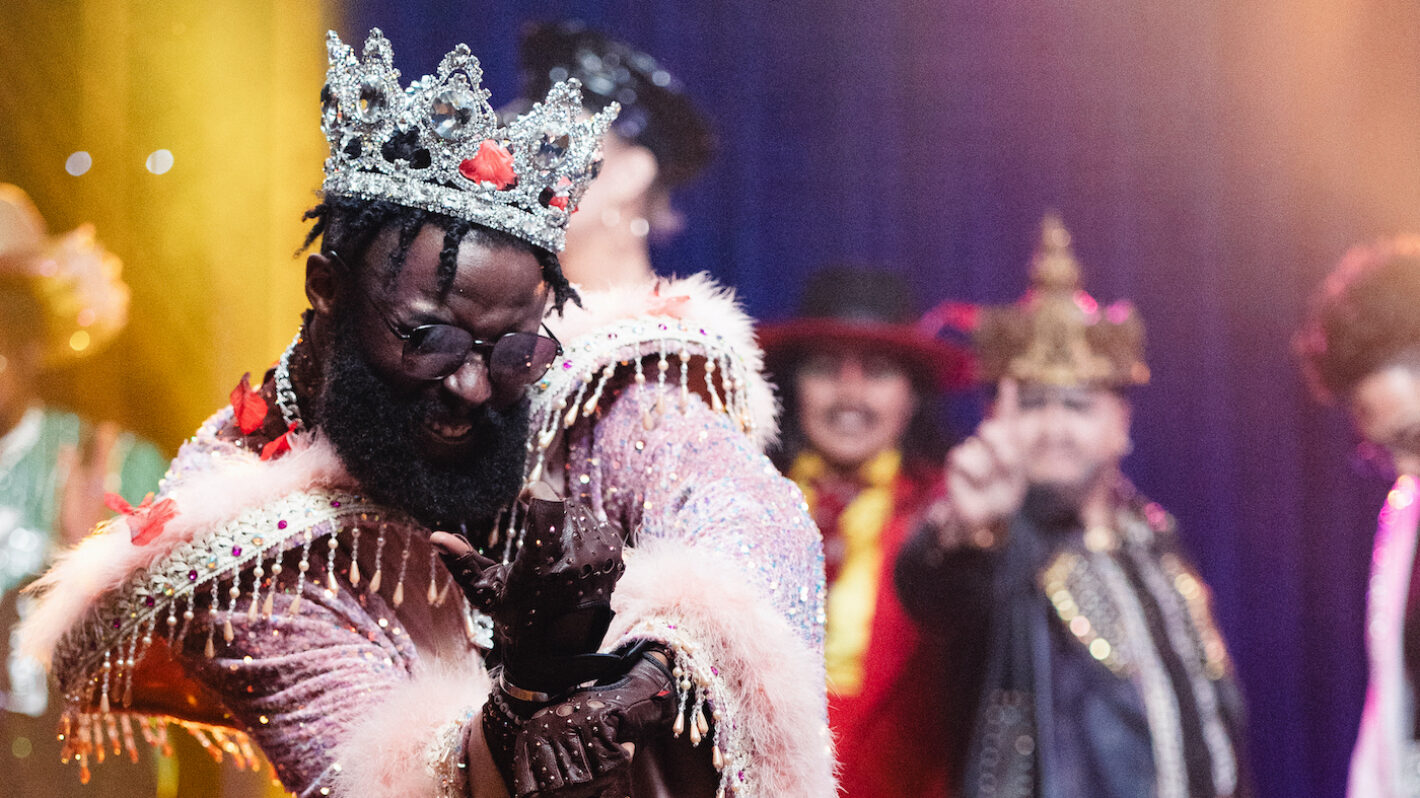
King of Drag, the only drag king competition show on TV, activated the LGBTQ+ community with a big bang, and it’s clear why. Despite an increase in drag-centric media, this was the first series deliberately focusing on spotlighting these kinds of artists. Even a year after its premiere, fans are still raving about the show, with season one delivering a level of kingly charisma nobody could’ve expected — making it all the more exciting when it was announced that King of Drag was officially casting for season two!
As co-founder of Revry — the LGBTQ+ streaming service that hosts King of Drag — and co-creator of this hit competition show, Damian Pelliccione understands the power that media has on its audiences. It’s why they work every day to create LGBTQ+ content anyone can enjoy, and it’s why they fought to get King of Drag televised and ensure it was a space where kings could finally be celebrated. Sitting down with the Los Angeles Blade to discuss the series’ season two announcement and what it’s meant to be a part of such a trailblazing franchise, they started this interview by making one thing very clear: “We’ve always been fully invested in casting and promoting Drag Kings on our shows.”
The co-founder spoke about how representing marginalized identities has always been an integral part of Revry’s mission. “We’ve always been very inclusive in our casting to make sure that we [work with] kings just as much as we work with Queens.” It’s a sentiment that, unfortunately, most other drag-centric series don’t share. RuPaul’s Drag Race, especially, has been criticized for refusing to cast anyone who wouldn’t fall under the umbrella of ‘queen.’ And while subversive programs like The Boulet Brothers’ Dragula do allow drag kings to compete, the show typically only allows one or two each season, meaning that there’s only a short time to discuss the boundless intricacies that exist in this art form.
This means that while drag king representation exists, it’s only been a trickle amidst the wave of awareness that drag queens have received in recent years. This phenomenon never sat right with Damian and their Revry team — so they decided to do something about it.
After years of searching for sponsors to get the show made, King of Drag officially premiered in June 2025 to widespread acclaim. Fans were instantly taken by the bombastic competition; while its format is similar to many other series’, the hilarious judging panel (led by the amazing Murray Hill) and jaw-dropping challenges were endlessly zany while also perfect avenues for contestants to show their immense talent. Almost growing emotional, Pelliccione recounted the widespread support the series received after its first few episodes, saying, “[Viewers] come forward to say, ‘Thank you for creating something that is not just about fighting or cattiness.’ It’s an elimination show, but you could see the authenticity in the heart of these kings…you could see their struggles, and [what it took] to create their art.” They fondly described the love this project hasn’t stopped receiving since it first came out — but they also detailed the rampant hatred that has come along with it.
It shouldn’t be forgotten that King of Drag was produced and aired early into the current presidential term, with the early months of 2025 seeing a level of anti-trans and homophobic rhetoric filling the U.S. in a way many viewers had never seen before. Damian recalled how, in the face of this hatred, their team understood that audiences needed King of Drag now more than ever. “It’s somewhat an act of defiance having a show like King of Drag — and having a network like Revry [altogether],” they said, filled with pride. “You can’t stop progress, and we’ve already come so far as a society (at least, I hope we have), so going back does not seem realistic. And I think that we’re seeing resistance now to our sitting government, and hopefully this carries into our midterm elections!”
A resistance that was buoyed by King of Drag, with each episode introducing viewers to nonstop drag excellence and thoughtful conversations on what it means to be a queer artist today. This, combined with the wild challenges — ranging from queer quiz shows to boy band performances — turned the initial installment into a raucously prideful experience for everyone watching. For almost a year now, fans have applauded all that the show was able to accomplish, and Damian assures these viewers that there’s even more coming in season two.
“Some of the biggest things we’re really excited about in this season are [not only] a few returning challenges, but we are [also] really bringing on a whole new level of celebrity guest judges,” raved the excited co-creator. “We’re really tailoring our [judges] so that they could be a kind of mentor or advisor. [Helping] build something that the king can use for their future career!” It was this point especially that Damian emphasized as the heart of King of Drag, recognizing that while having your time in the spotlight is amazing, bills still need to be paid when the cameras are shut off. “I want kings who come off our show booked and blessed. What else can we do as a network just to help support those careers?’”
With the interview coming to an end, Damian was asked the question that thousands of drag kings are currently thinking: how can I get cast? Typically, producers answer this style of inquiry with vague advice about uniqueness and skill — but not Damian. Still wanting only the best for their contestants, they plainly stated, “My one word of advice: this is not a side hustle.”
“The purpose of being on the show is to create a career for you…We want people who are really serious about the art form and have their own specific take on what it is to be a drag king. We want your authenticity, and we want to see that this is a career path for you. We [want to know] that this is something that you’re ready to take to the next level.”
An ambitious yet thoroughly uplifting goal for the many kings currently getting their applications together. And with that advice, the creator made one thing very clear: King of Drag exists not only to spotlight drag kings, but to bring them and their art form to the forefront of queer entertainment. It’s a revolutionary undertaking that viewers can watch unfold in each scene, and if a drag king feels ready to join in and become a part of this mission, Damian invites them to gather up their best drag and apply for season two today.
King of Drag season 1 is streaming on Revry
Books
New book profiles LGBTQ+ Ukrainians, documents war experiences
Tuesday marks four years since Russia attacked Ukraine

Journalist J. Lester Feder’s new book profiles LGBTQ+ Ukrainians and their experiences during Russia’s war against their country.
Feder for “The Queer Face of War: Portraits and Stories from Ukraine” interviewed and photographed LGBTQ+ Ukrainians in Kyiv, the country’s capital, and in other cities. They include Olena Hloba, the co-founder of Tergo, a support group for parents and friends of LGBTQ+ Ukrainians, who fled her home in the Kyiv suburb of Bucha shortly after Russia launched its war on Feb. 24, 2022.
Russian soldiers killed civilians as they withdrew from Bucha. Videos and photographs that emerged from the Kyiv suburb showed dead bodies with their hands tied behind their back and other signs of torture.

Olena Shevchenko, chair of Insight, a Ukrainian LGBTQ+ rights group, wrote the book’s forward.

The book also profiles Viktor Pylypenko, a gay man who the Ukrainian military assigned to the 72nd Mechanized Black Cossack Brigade after the war began. Feder writes Pylypenko’s unit “was deployed to some of the fiercest and most important battles of the war.”
“The brigade was pivotal to beating Russian forces back from Kyiv in their initial attempt to take the capital, helping them liberate territory near Kharkiv and defending the front lines in Donbas,” wrote Feder.
Pylypenko spent two years fighting “on Ukraine’s most dangerous battlefields, serving primarily as a medic.”
“At times he felt he was living in a horror movie, watching tank shells tear his fellow soldiers apart before his eyes,” wrote Feder. “He held many men as they took their final breaths. Of the roughly one hundred who entered the unit with him, only six remained when he was discharged in 2024. He didn’t leave by choice: he went home to take care of his father, who had suffered a stroke.”
Feder notes one of Pylypenko’s former commanders attacked him online when he came out. Pylypenko said another commander defended him.
Feder also profiled Diana and Oleksii Polukhin, two residents of Kherson, a port city in southern Ukraine that is near the mouth of the Dnieper River.
Ukrainian forces regained control of Kherson in November 2022, nine months after Russia occupied it.
Diana, a cigarette vender, and Polukhin told Feder that Russian forces demanded they disclose the names of other LGBTQ+ Ukrainians in Kherson. Russian forces also tortured Diana and Polukhin while in their custody.
Polukhim is the first LGBTQ+ victim of Russian persecution to report their case to Ukrainian prosecutors.

Feder, who is of Ukrainian descent, first visited Ukraine in 2013 when he wrote for BuzzFeed.
He was Outright International’s Senior Fellow for Emergency Research from 2021-2023. Feder last traveled to Ukraine in December 2024.
Feder spoke about his book at Politics and Prose at the Wharf in Southwest D.C. on Feb. 6. The Los Angeles Blade spoke with Feder on Feb. 20.
Feder told the Blade he began to work on the book when he was at Outright International and working with humanitarian groups on how to better serve LGBTQ+ Ukrainians. Feder said military service requirements, a lack of access to hormone therapy and documents that accurately reflect a person’s gender identity and LGBTQ+-friendly shelters are among the myriad challenges that LGBTQ+ Ukrainians have faced since the war began.
“All of these were components of a queer experience of war that was not well documented, and we had never seen in one place, especially with photos,” he told the Blade. “I felt really called to do that, not only because of what was happening in Ukraine, but also as a way to bring to the surface issues that we’d had seen in Iraq and Syria and Afghanistan.”

Feder also spoke with the Blade about the war’s geopolitical implications.
Russian President Vladimir Putin in 2013 signed a law that bans the “promotion of homosexuality” to minors.
The 2014 Winter Olympics took place in Sochi, a Russian resort city on the Black Sea. Russia annexed Crimea from Ukraine a few weeks after the games ended.
Russia’s anti-LGBTQ+ crackdown has continued over the last decade.
The Russian Supreme Court in 2023 ruled the “international LGBT movement” is an extremist organization and banned it. The Russian Justice Ministry last month designated ILGA World, a global LGBTQ+ and intersex rights group, as an “undesirable” organization.
Ukraine, meanwhile, has sought to align itself with Europe.
Ukrainian President Volodymyr Zelenskyy after a 2021 meeting with then-President Joe Biden at the White House said his country would continue to fight discrimination based on sexual orientation and gender identity. (Zelenskyy’s relationship with the U.S. has grown more tense since the Trump-Vance administration took office.) Zelenskyy in 2022 publicly backed civil partnerships for same-sex couples.
Then-Ukrainian Ambassador to the U.S. Oksana Markarova in 2023 applauded Kyiv Pride and other LGBTQ+ and intersex rights groups in her country when she spoke at a photo exhibit at Ukraine House in D.C. that highlighted LGBTQ+ and intersex soldiers. Then-Kyiv Pride Executive Director Lenny Emson, who Feder profiles in his book, was among those who attended the event.
“Thank you for everything you do in Kyiv, and thank you for everything that you do in order to fight the discrimination that still is somewhere in Ukraine,” said Markarova. “Not everything is perfect yet, but you know, I think we are moving in the right direction. And we together will not only fight the external enemy, but also will see equality.”
Feder in response to the Blade’s question about why he decided to write his book said he “didn’t feel” the “significance of Russia’s war against Ukraine” for LGBTQ+ people around the world “was fully understood.”
“This was an opportunity to tell that big story,” he said.
“The crackdown on LGBT rights inside Russia was essentially a laboratory for a strategy of attacking democratic values by attacking queer rights and it was one as Ukraine was getting closet to Europe back in 2013, 2014,” he added. “It was a strategy they were using as part of their foreign policy, and it was one they were using not only in Ukraine over the past decade, but around the world.”
Feder said Republicans are using “that same strategy to attack queer people, to attack democracy itself.”
“I felt like it was important that Americans understand that history,” he said.
Out & About
Queer, trans AAPI joy shone at this year’s Golden Dragon Parade
In this photo essay, the Blade documents resilience and queer euphoria at Saturday’s Lunar New Year festivities.
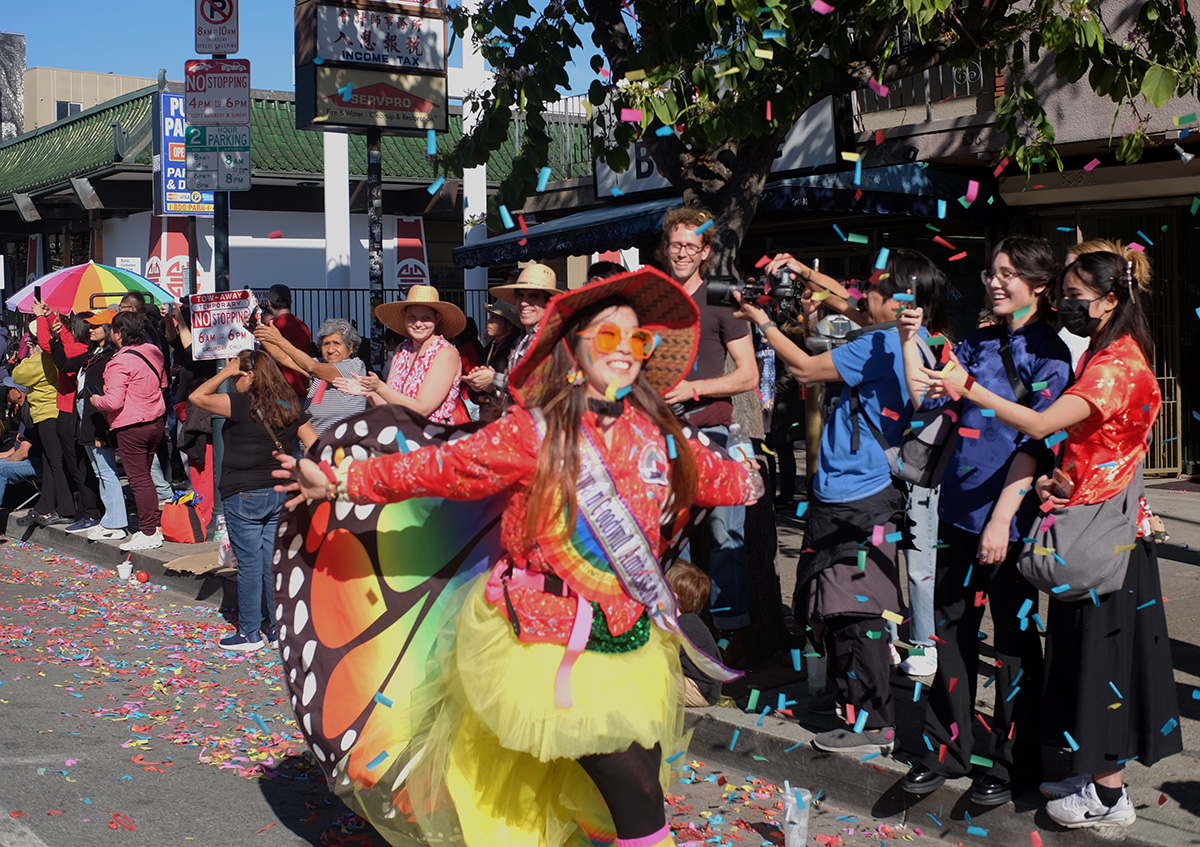
On Saturday afternoon, under a hot, beating sun, I marched at the annual Golden Dragon Parade in L.A.’s Chinatown with members of the API Rainbow Coalition: a network of organizations that protects, centers, and uplifts the safety and joy of queer and trans Asian American and Pacific Islander (QTAPI) people.
Composed of groups like Asian Americans Advancing Justice Southern California (AJSOCAL), Okaeri, Access to Prevention Advocacy Intervention and Treatment (APAIT), and PFLAG San Gabriel Valley / API, the coalition has shown up for two decades to greet the parade’s spectators with warm wishes for the new year, and to combat anti-LGBTQ+ fear and hate with boundless joy and togetherness.
For myself and many others present on Saturday, it was our first time marching in the parade. It was our first time standing definitively, amidst thousands of people, as proud queer QTAPI people. Will Zhang, who was one of six people holding up a beautiful silk dragon that bore the pink and blue shades of the Trans Pride Flag rather than the symbol’s traditional red and yellow hues, said that being with the community at events like these felt like he could finally “unmask.” He felt able to embody his full self.
For the first time back in my Southern Californian roots, I felt truly liberated. Adrenaline pulsed through my limbs, shocking me alive with a boldness I had never experienced as a closeted kid growing up in the San Gabriel Valley. At the parade, I cheered and jumped, waved at strangers with an elation that extended from deep within my body and then flew beyond me.
That uninhibited, childlike wonder that first trickled out, broke like a dam: a flooding of joy that was made possible only because I felt so safe and embraced alongside allies, both new and old, who continue to nurture a path of liberation for ourselves and for future generations.
There is hostility abound, but gathering allows us to rebel and become stronger. “Goodness prevails,” Zhang said, as we continued to march ahead.
All image captures by Kristie Song.
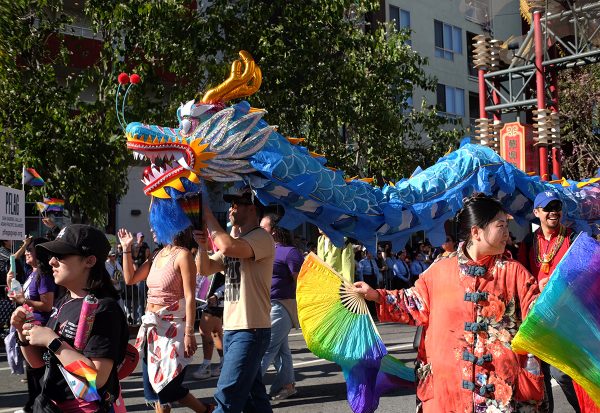
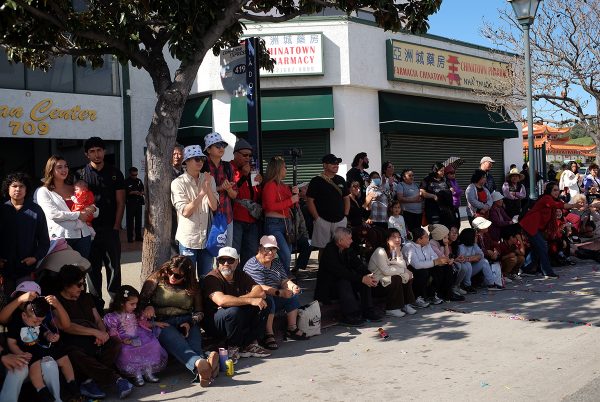
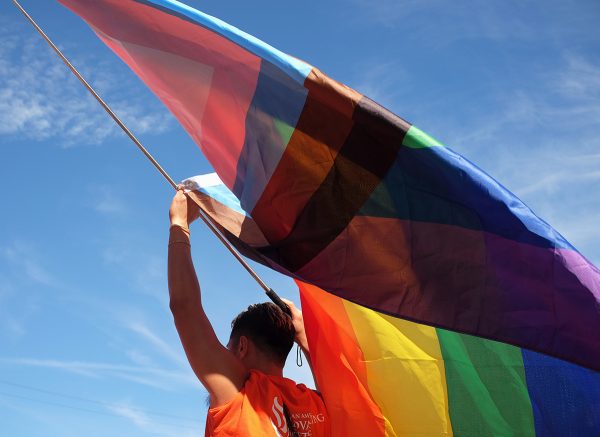
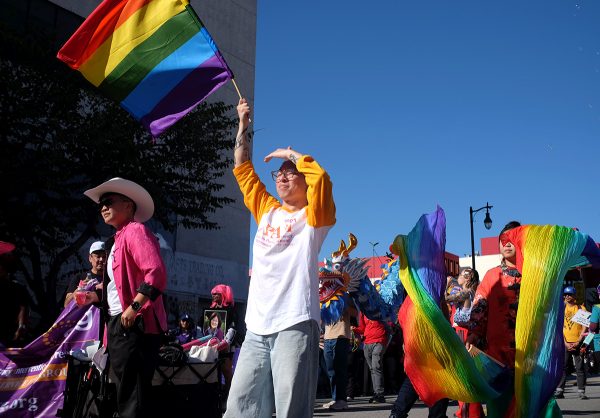
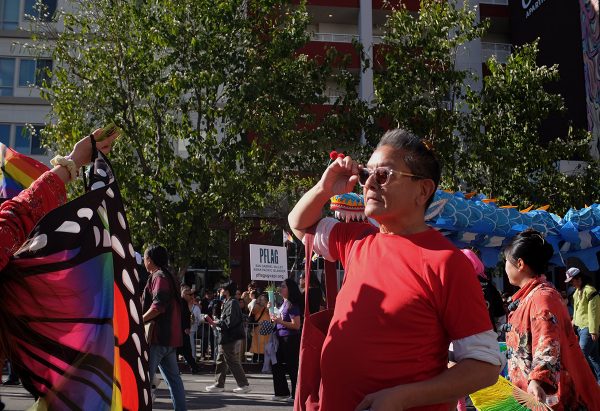
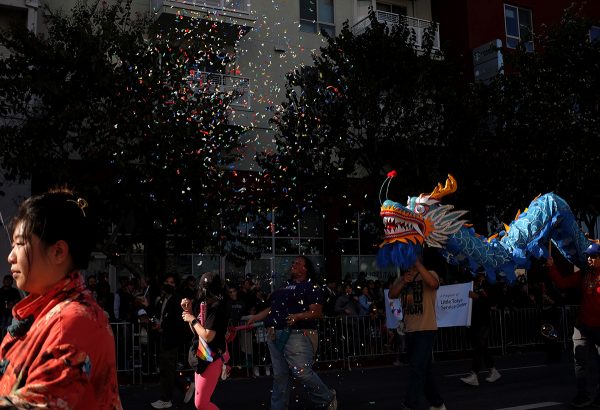
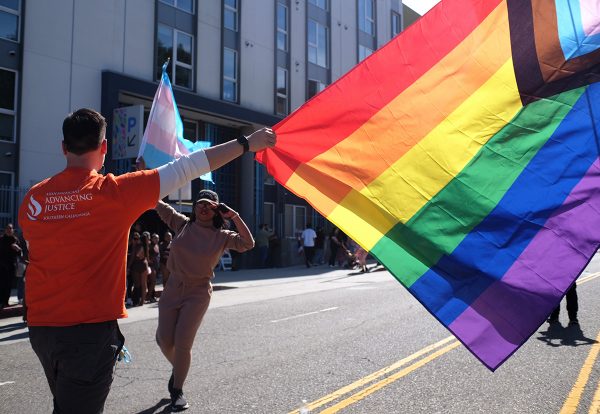
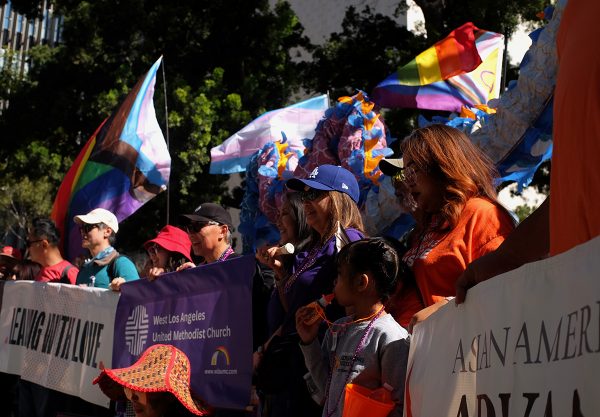
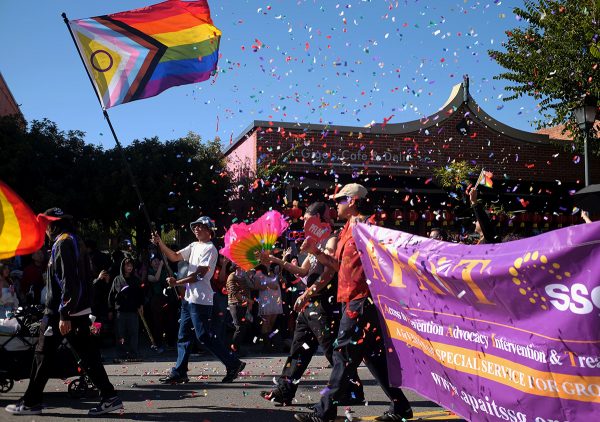
Kristie Song is a California Local News Fellow placed with the Los Angeles Blade. The California Local News Fellowship is a state-funded initiative to support and strengthen local news reporting. Learn more about it at fellowships.journalism.berkeley.edu/cafellows.
Movies
Radical reframing highlights the ‘Wuthering’ highs and lows of a classic
Emerald Fennell’s cinematic vision elicits strong reactions

If you’re a fan of “Wuthering Heights” — Emily Brontë’s oft-filmed 1847 novel about a doomed romance on the Yorkshire moors — it’s a given you’re going to have opinions about any new adaptation that comes along, but in the case of filmmaker Emerald Fennell’s new cinematic vision of this venerable classic, they’re probably going to be strong ones.
It’s nothing new, really. Brontë’s book has elicited controversy since its first publication, when it sparked outrage among Victorian readers over its tragic tale of thwarted lovers locked into an obsessive quest for revenge against each other, and has continued to shock generations of readers with its depictions of emotional cruelty and violent abuse, its dysfunctional relationships, and its grim portrait of a deeply-embedded class structure which perpetuates misery at every level of the social hierarchy.
It’s no wonder, then, that Fennell’s adaptation — a true “fangirl” appreciation project distinguished by the radical sensibilities which the third-time director brings to the mix — has become a flash point for social commentators whose main exposure to the tale has been flavored by decades of watered-down, romanticized “reinventions,” almost all of which omit large portions of the novel to selectively shape what’s left into a period tearjerker about star-crossed love, often distancing themselves from the raw emotional core of the story by adhering to generic tropes of “gothic romance” and rarely doing justice to the complexity of its characters — or, for that matter, its author’s deeper intentions.
Fennell’s version doesn’t exactly break that pattern; she, too, elides much of the novel’s sprawling plot to focus on the twisted entanglement between Catherine Earnshaw (Margot Robbie), daughter of the now-impoverished master of the titular estate (Martin Clunes), and Heathcliff (Jacob Elordi), a lowborn child of unknown background origin that has been “adopted” by her father as a servant in the household. Both subjected to the whims of the elder Earnshaw’s violent temper, they form a bond of mutual support in childhood which evolves, as they come of age, into something more; yet regardless of her feelings for him, Cathy — whose future status and security are at risk — chooses to marry Edgar Linton (Shazad Latif), the financially secure new owner of a neighboring estate. Heathcliff, devastated by her betrayal, leaves for parts unknown, only to return a few years later with a mysteriously-obtained fortune. Imposing himself into Cathy’s comfortable-but-joyless matrimony, he rekindles their now-forbidden passion and they become entwined in a torrid affair — even as he openly courts Linton’s naive ward Isabella (Alison Oliver) and plots to destroy the entire household from within. One might almost say that these two are the poster couple for the phrase “it’s complicated.” and it’s probably needless to say things don’t go well for anybody involved.
While there is more than enough material in “Wuthering Heights” that might easily be labeled as “problematic” in our contemporary judgments — like the fact that it’s a love story between two childhood friends, essentially raised as siblings, which becomes codependent and poisons every other relationship in their lives — the controversy over Fennell’s version has coalesced less around the content than her casting choices. When the project was announced, she drew criticism over the decision to cast Robbie (who also produced the film) opposite the younger Elordi. In the end, the casting works — though the age gap might be mildly distracting for some, both actors deliver superb performances, and the chemistry they exude soon renders it irrelevant.
Another controversy, however, is less easily dispelled. Though we never learn his true ethnic background, Brontë’s original text describes Heathcliff as having the appearance of “a dark-skinned gipsy” with “black fire” in his eyes; the character has typically been played by distinctly “Anglo” men, and consequently, many modern observers have expressed disappointment (and in some cases, full-blown outrage) over Fennel’s choice to use Elordi instead of putting an actor of color for the part, especially given the contemporary filter which she clearly chose for her interpretation for the novel.
In fact, it’s that modernized perspective — a view of history informed by social criticism, economic politics, feminist insight, and a sexual candor that would have shocked the prim Victorian readers of Brontë’s novel — that turns Fennell’s visually striking adaptation into more than just a comfortably romanticized period costume drama. From her very opening scene — a public hanging in the village where the death throes of the dangling body elicit lurid glee from the eagerly-gathered crowd — she makes it oppressively clear that the 18th-century was not a pleasant time to live; the brutality of the era is a primal force in her vision of the story, from the harrowing abuse that forges its lovers’ codependent bond, to the rigidly maintained class structure that compels even those in the higher echelons — especially women — into a kind of slavery to the system, to the inequities that fuel disloyalty among the vulnerable simply to preserve their own tenuous place in the hierarchy. It’s a battle for survival, if not of the fittest then of the most ruthless.
At the same time, she applies a distinctly 21st-century attitude of “sex-positivity” to evoke the appeal of carnality, not just for its own sake but as a taste of freedom; she even uses it to reframe Heathcliff’s cruel torment of Isabella by implying a consensual dom/sub relationship between them, offering a fragment of agency to a character typically relegated to the role of victim. Most crucially, of course, it permits Fennell to openly depict the sexuality of Cathy and Heathcliff as an experience of transgressive joy — albeit a tormented one — made perhaps even more irresistible (for them and for us) by the sense of rebellion that comes along with it.
Finally, while this “Wuthering Heights” may not have been the one to finally allow Heathcliff’s ambiguous racial identity to come to the forefront, Fennell does employ some “color-blind” casting — Latif is mixed-race (white and Pakistani) and Hong Chau, understated but profound in the crucial role of Nelly, Cathy’s longtime “paid companion,” is of Vietnamese descent — to illuminate the added pressures of being an “other” in a world weighted in favor of sameness.
Does all this contemporary hindsight into the fabric of Brontë’s epic novel make for a quintessential “Wuthering Heights?” Even allowing that such a thing were possible, probably not. While it presents a stylishly crafted and thrillingly cinematic take on this complex classic, richly enhanced by a superb and adventurous cast, it’s not likely to satisfy anyone looking for a faithful rendition, nor does it reveal a new angle from which the “romance” at its center looks anything other than toxic — indeed, it almost fetishizes the dysfunction. Even without the thorny debate around Heathcliff’s racial identity, there’s plenty here to prompt purists and revisionists alike to find fault with Fennell’s approach.
Yet for those looking for a new window into to this perennial classic, and who are comfortable with the radical flourish for which Fennell is already known, it’s an engrossing and intellectually stimulating exploration of this iconic story in a way that exchanges comfortable familiarity for unpredictable chaos — and for cinema fans, that’s more than enough reason to give “Wuthering Heights” a chance.
a&e features
‘Pee-wee as Himself’ and ‘Lurker’ directors on how queer audiences have reacted to their Spirit Award-winning films
“It’s been revelatory for young people,” Matt Wolf said of telling Paul Reubens’ coming out story

This year’s Film Independent Spirit Awards winners told wide-ranging stories of everything from Paul Reubens’ posthumous coming out in Pee-wee as Himself to a fictional homoerotic relationship that forms between an artist and his biggest fan in Lurker.
With such a diverse group of winners, these filmmakers reflected on how queer people and young audiences have responded to their work.
“I’ve talked to people whose kids have seen the film, and young kids don’t understand what the closet is,” Pee-wee as Himself director Matt Wolf told The Blade backstage. “As a younger, gay filmmaker, I felt like I could help him do that on his own terms. It was a big deal for Paul. It’s interesting to hear from people’s kids who don’t understand the struggle.”
Wolf continued: “It’s been revelatory for young people in that sense, but also I’m hearing from people that their kids are now watching Pee-wee’s Playhouse, and that they love it. And you never know, does this thing look old? Does it feel outdated? [His films are] so otherworldly, and I don’t think young people register it as being from any time.”
Lurker director Alex Russell (who previously wrote on Beef and The Bear) nabbed awards for best first screenplay and best first feature, and Théodore Pellerin and Archie Madekwe were nominated for their performances. Russell’s win is a testament to Film Independent’s legacy of embracing new generations of filmmakers and storytellers.
While accepting the award for best first screenplay, Russell recognized the creatives who took a chance on him, saying: “I want to thank everyone who was willing to look stupid and put even just a sliver of themselves on the line to legitimize all these new filmmakers here tonight, who, without you, would still be aspiring to make their first movie.”
Backstage, The Blade asked the breakthrough filmmaker about how queer people have responded to the film’s thorny take on male relationships.
“I don’t know if the queer community has reacted to me personally. There’s an interesting discussion in what Matthew and Olivier’s relationship is all about … and where they stand on the spectrum,” Russell said. “I want people to think about that, I want people to think about the ambiguity of that. That being said, if the queer community wants to talk to me about it, I’m here!”
Pee-wee as Himself is available to stream on HBO Max, while Lurker is on MUBI.
a&e features
Liveplay series ‘Gladlands’ finds hope in the unlikeliest of places
The cast of ‘Dimension 20’s’ latest season discusses bringing chaos and community to their many loyal fans.

Sometimes, it takes everything falling apart for us to remember that community is what holds us together.
It’s a lesson that many people have learned in recent months. Amidst the ongoing attacks against LGBTQ+ and immigrant populations, folks across the country have come to realize just how important community is to each of our daily lives.
Now more than ever, marginalized communities need to remember that oppressors have always used grief to further disenfranchise the people they’re attacking. And that, as laughable as it seems at times, the best response to others’ hatred is to love one another; to foster strength and joy amongst our own groups to ensure we have the fortitude necessary in the ongoing fight against bigotry. Many projects have tried to remind folks of this message…and one just so happens to be a tabletop roleplaying game (TTRPG) set in a post-apocalyptic — and so, so queer — wasteland.
Gladlands is the latest season of Dimension 20, a renowned TTRPG liveplay series that sees groups of LA-based performers tackle some chaotic new narrative every season. The show’s newest installment takes place in a barren wasteland, with all cities and symbols of civilization reduced to rubble after a multi-year ecological crisis (which just so happens to resemble the one we’re currently fighting right now). The cast, which features a majority LGBTQ+ group of LA-based comedians, plays a team of folks trying to help as many people in this hellscape as possible, reminding every survivor they come across that it’s easiest to get through the hard times when we’re in them together.
The cast of Gladlands sat down with the LA Blade to discuss this poignant message and how it feels to deliver it when folks need it most. They speak about their roles in the series, their personal lives as local artists in Los Angeles, and how it’s fun pieces of media like this that can get folks through the toughest times. They raved about this complex project and what they hope it will bring to everyone who watches, with each player emphasizing Gladlands’ core message: you are not alone.
As strange as it may seem to people not in the community, it’s not uncommon for role-playing games like Gladlands to touch on issues real people struggle with every day. “It really is transformative,” said Oscar Montoya, who plays the fierce Drag Queen librarian ‘Poppy Persona’ on the season. “There’s a little bit of your soul that goes into every character that you play…and there’s so much self-realization that comes when you play TTRPG that you [may not] even recognize!” It’s a sentiment that fellow player Kimia Behpoornia, who plays the skateboarding cockroach-human hybrid ‘Tess Tube5,’ echoed, stating, “[These games] help people feel so validated.”
The cast reiterated how it’s these sessions of fantasy that often allow people to grow in very real ways. That’s why they believed it was the perfect platform to spread the message of love threaded throughout Gladlands, a season that sees their group of apocalyptic advocates — members of the legendary ‘Carer-Van’ — drive across an endless desert in search of anyone who needs help. An eclectic group of humans and mutants, each episode sees them work hard to see the good in their fellow person and flex their many skills to assist those in need.
“It’s really nice that this season is here [during a time] when it really resonates,” Kimia went on. “But it’s kind of the simplest idea [ever] to want to help your community!” Vic Michaelis, whose plague mask-wearing character ‘Hugi’ is the apocalypse’s only mortician, stressed that the show’s message is one that everyone needs to remember right now. “We’re living during a time [when] community is very important…but there’s no way [when we were filming] that we would’ve known the season would come out at a time like this. But [we are] watching people dig down right now and go, ‘We are taking care of our community.’” They reminded everyone watching that this kind of communal care is not only inspiring, but also threatening, saying, “That strikes fear amongst people in power. There is success in coming together to protect your community, [which I think] reflects the themes of Gladlands.”
“Trying to stay glad is, in itself, a form of resistance,” Agreed Jacob Wysocki, who portrays the warm and cuddly caretaker KoKoMo. He detailed how, through their characters, each player hoped to offer viewers models of the many behaviors that allow real communities to flourish. On that in particular, he gave credit to the season’s dungeon master, Brennan Lee Mulligan, saying, “He built this world because he looked at the [real] world we’re in and [asked], ‘Does it take a fully post-apocalyptic world to get to a space where community [comes] first?’”
“Baby — we live in the post-apocalyptic times right now!” Said Montoya, whose time as a Los Angeles activist has given him special insight into how this city’s communities have been struggling. “[But] I think the important thing to realize is that we create our own Gladlands…the message of community coming together to combat adversity is so paramount, especially right now. To have a collection of people you can lean on and say, ‘We don’t like this. We don’t stand for this. Let’s create something together.”
Each cast member agreed that, while a lovely sentiment, the messages broadcast through their show are easier said than done. But they each emphasized that you don’t need to be part of a roving band of super-powered caretakers to do good — and that no matter what, this kind of work should never be done in solitude. “[Remember] you’re not in it alone,” emphasized Montoya, as the interviews came to an end. “You are a part of a community that can enact change. And know: they’re trying to take that away from us. They’re trying to make us feel smaller and less than. [But] you have to recognize that we have the power…especially when it feels so overwhelming. Because it is then that you have people who have your back, who will continue to have your back [no matter what].”
An uplifting message of community, wrapped up in a chaotic season of jaw-dropping dice rolls and truly wild character arcs. Gladlands showcases that, sometimes, the most important lessons come in the most surprising packages. And, with each of these performers at the helm, it highlights the core message of this series as a whole: you’re never alone in the fight for community. And true freedom starts with being there for your neighbors, making sure that you all have what you need for whatever may come next.
a&e features
Tello Films: Celebrating 19 years of lesbian storytelling
Tello Films proves that, after 19 years, independent lesbian filmmaking is as necessary as ever.
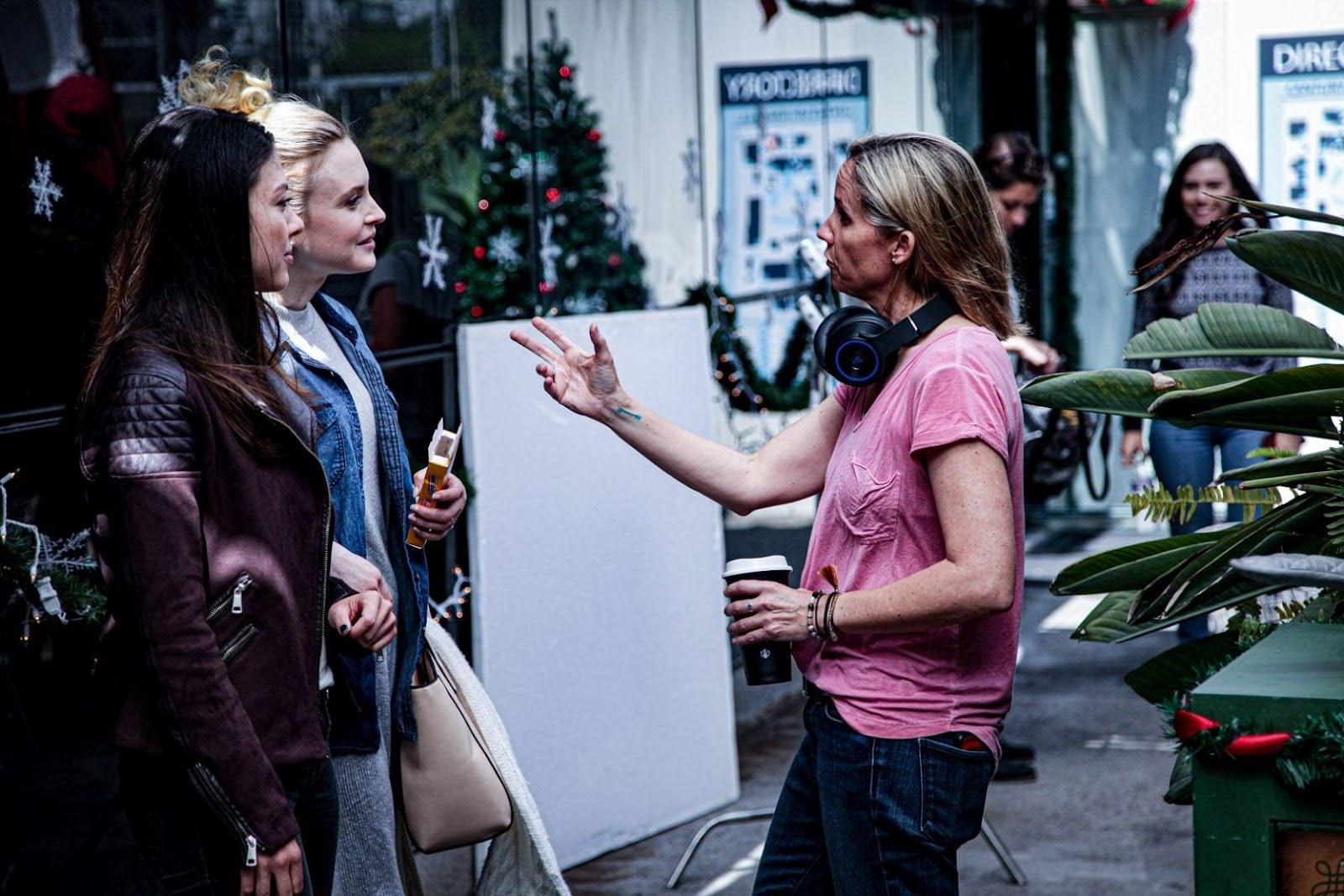
In an era where LGBTQ representation in movies has hit a three-year low, Tello Films proves that, after 19 years, independent lesbian filmmaking is as necessary as ever. According to Sarah Kate Ellis, the CEO and President of GLAAD, “Nearly ⅓ of non-LGBTQ Americans say that LGBTQ inclusive films have changed their perception of our community… It is imperative that networks and streamers do not back down.”
Meanwhile, the lesbian streaming service Tello Films celebrated its 19th birthday on February 6th. Says founder Christin Baker, “When I started it 19 years ago, I thought at some point maybe we wouldn’t be necessary, […] I really do feel like representation saves lives…it’s still important for us to be around.” Often referred to as the “Lesbian Netflix”, the Nashville-based production company has a primary focus on lesbian and sapphic stories for the past 19 years and thankfully, is just getting started.
Tello Films was far ahead of its time. For those of you who didn’t live through or don’t remember, 2007 was a different time. Apple debuted the first iPhone, Barack Obama declared his run for the presidency, and the phrase “that’s so gay!” was prevalent as ever (at least at my high school). “We didn’t have marriage equality at that time. Civil unions were kind of starting here and there -the crazy thing (is that) ‘Don’t Ask Don’t Tell’ was still in effect.” Baker recalls, “There were still so many rights we didn’t have in 2007 when we started it, and we are still fighting for it.”
Tello Films’ beginnings were just the start of the lesbian legacy. Said Christin, “I never thought Tello would or could ever be my full-time job.” With the URL TelloFilms.com registered on February 6, 2007, the platform was an internet-based streaming company with all its movies formatted small to appease a 2007-era browser. While Netflix was only just beginning to offer streaming services, launching any streaming service in 2007 was bold; to launch a streaming service entirely devoted to lesbian and sapphic stories was revolutionary. “I want to make lesbian stories.. I want to see things that represent me.”
In the past 19 years, Baker shares her career-defining moment came from the recently deceased Nancylee Myatt, showrunner for South of Nowhere. “We made a short-form series called Cowgirl Up. I felt like I put my big girl pants on. Nancylee was a huge mentor, and I was like, ‘Oh, I can do this. I can do this, and I can figure it out.’”
Tello went on to receive their first primetime Emmy nomination with Mindy Sterling of Austin Powers fame for Outstanding Actress in a Short Form Comedy or Drama Series. “We got two daytime Emmy nominations for two actresses, Liz Vassey and Carolyn Radere […], then in 2018 we made our first lesbian Christmas movie,, Season of Love and that really kind of started us down the path, and I think we’re probably most well known for, which is our lesbian holiday rom-coms.”
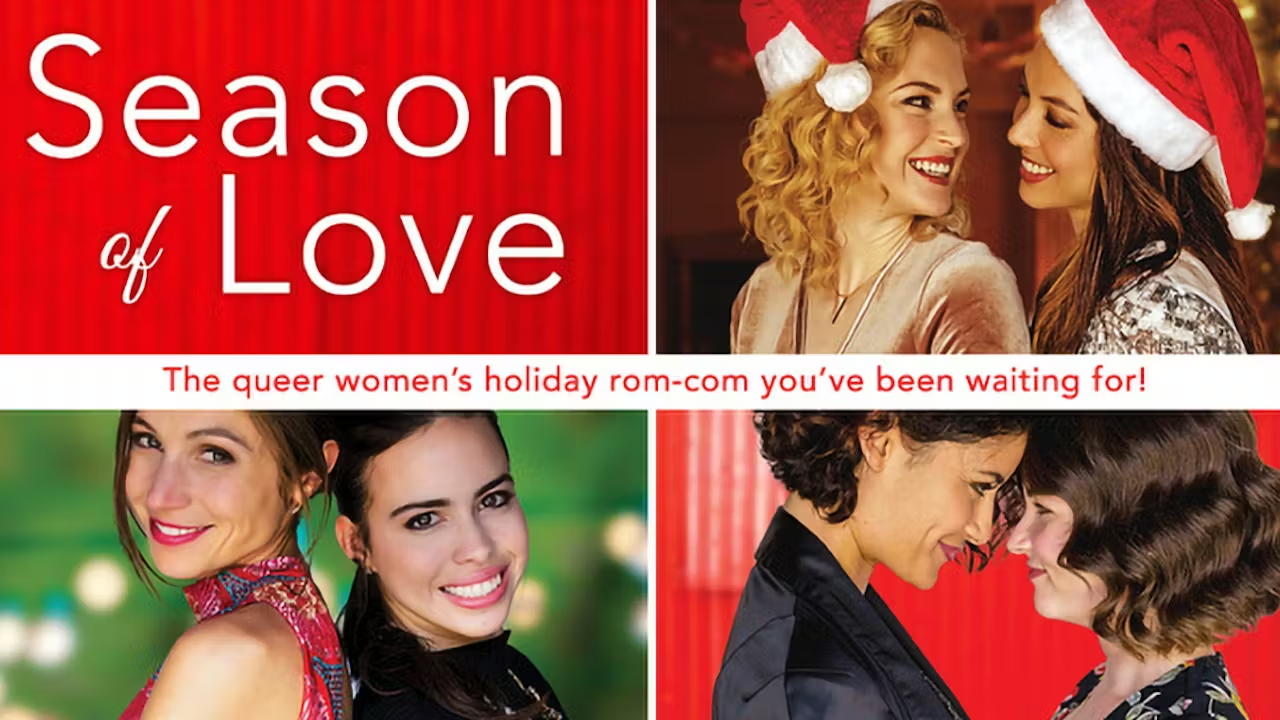
We now live in the era of Chappell Roan, Doechii, Heated Rivalry, and so many more queer artists and pieces of media in the mainstream’s consciousness. The last several years in pop culture have proven that queer art and artists matter, not just as a salve to a society that still struggles to accept us, but to the mass audiences who continue to resonate with it.
Queer media is being devoured by folks outside of the LGBTQ community. “I think it (Heated Rivalry) shocked so many people (because) it was powerful and compelling […] I wasn’t that surprised because I remember Brokeback Mountain being very much in that same vein; it was just cowboys instead of hockey players.” Authenticity and overcoming adversity are not just tenets of good storytelling; they are also ever-present themes within the lives of any queer you know.
As Christin sees it, the success of Heated Rivalry isn’t just rooted in its unabashed sexual themes, it has a very universal “lesbian” approach to its storytelling “There’s a ton of longing, and missing, and having a crush and not knowing if it’s reciprocated, […] there’s a lot that you tap into just on a human level that Heated Rivalry really touched on.”
Themes that are at the forefront of the sapphic stories Tello has mastered telling. “We still don’t have enough LGBTQ holiday Christmas movies out there each year. Some people wouldn’t look at a Hallmark movie or Christmas rom-com as substantive, but I really do feel like representation saves lives.”
For so many in the LGBTQ community, representation isn’t theoretical- it’s personal. I know for myself, in the throes of a messy divorce, one of the only things that brought me comfort was the sapphic films on Tello. It was so difficult to find lighthearted queer stories. I recall searching through every streaming service as they were slowly but surely eliminating the LGBTQ sections from their apps, as well as those queer characters and shows. But not Tello; I was able to find comfort and ease through a tough time in my personal life. “It’s such comfort, especially if you’ve gone through something that’s tough and your regular daily life is stressful, you need an escape to something that you know is not going to cause more anxiety.”
Having accessible ways to both tell and consume sapphic stories is tantamount to this moment in time. Independent filmmaking has the power to make sure authentic stories are heard. Being an independent voice as well as being able to support smaller budget stories that definitely wouldn’t get picked up, or even recognized or seen in mainstream, Christin and Tello Films are uplifting not just lesbian and sapphic stories, but lesbian and sapphic artists as well.
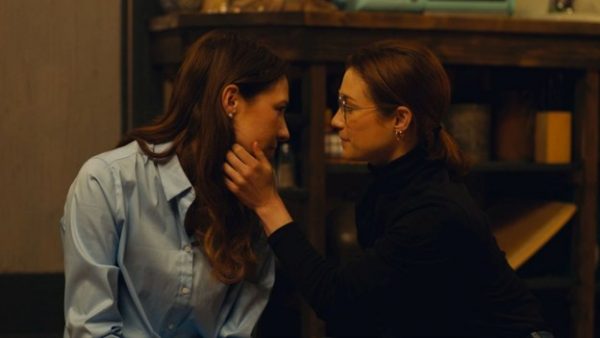
As for the future of lesbian filmmaking, it’s no secret that Hollywood is drowning, leaving a void for people like Christin and Tello Films to fill. Said Baker in light of the shrinkage in Hollywood and what that means for Tello Films, “We will get even more creative and tell even more stories, because we can’t be stopped.”
Encouraged by her fiancée, Stacey Lee Powell, Christin wants the world to know that Tello Films isn’t just a business, it’s personal. “I see Tello as an extension of me.” Says Baker, “In doing that, I hope that people see that Tello isn’t some corporate entity, I hope they see that it is someone who cares deeply. I’ve been doing this for 19 years, and every day I wake up trying to figure out how to tell our stories and how to serve our community.” Nineteen years later, Tello Films remains what it has always been: not a nameless, faceless corporation, but an extension of a storyteller’s dream to build a safe space for her community.
Check out TelloFilms.com
-

 Arts & Entertainment3 days ago
Arts & Entertainment3 days ago2026 Best of LGBTQ LA Finalist Voting
-

 Health4 days ago
Health4 days agoWhere medicine meets dignity: Be Well Medical Group founder Isaac Berlin is here and queer to serve the community
-

 Out & About4 days ago
Out & About4 days agoQueer, trans AAPI joy shone at this year’s Golden Dragon Parade
-

 Mexico5 days ago
Mexico5 days agoUS Embassy in Mexico issues shelter in place order for Puerto Vallarta
-

 Commentary3 days ago
Commentary3 days agoWhen optics matter more than harm: BAFTA, BBC, and editing solidarity while letting slurs slide on through
-

 California3 days ago
California3 days agoExperts discuss pathways forward as anti-trans violence continues to rise
-

 Autos4 days ago
Autos4 days agoGoing for gold: Ford Bronco Sport vs. Toyota RAV4
-

 Books3 days ago
Books3 days agoNew book profiles LGBTQ+ Ukrainians, documents war experiences
-

 a&e features3 days ago
a&e features3 days agoRevry Co-Founder Damian Pelliccione on why we need ‘King of Drag’
-

 Books2 days ago
Books2 days agoThe social side of self-pleasure: Artist Jason Wimberly presents his newest book of photography, HOMOSOCIAL





